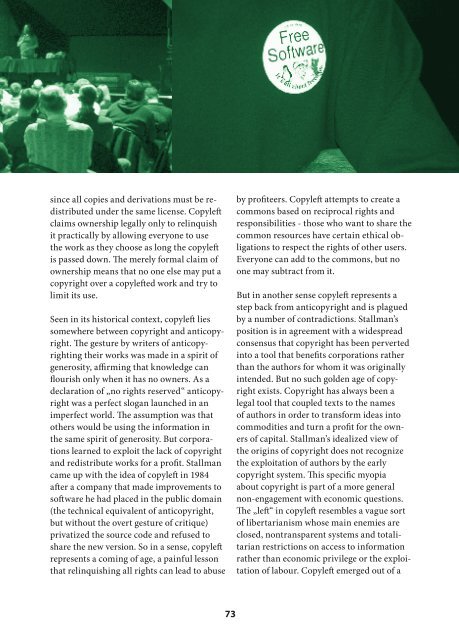Create successful ePaper yourself
Turn your PDF publications into a flip-book with our unique Google optimized e-Paper software.
since all copies and derivations must be redistributed<br />
under the same license. Copyleft<br />
claims ownership legally only to relinquish<br />
it practically by allowing everyone to use<br />
the work as they choose as long the copyleft<br />
is passed down. The merely formal claim of<br />
ownership means that no one else may put a<br />
copyright over a copylefted work and try to<br />
limit its use.<br />
Seen in its historical context, copyleft lies<br />
somewhere between copyright and anticopyright.<br />
The gesture by writers of anticopyrighting<br />
their works was made in a spirit of<br />
generosity, affirming that knowledge can<br />
flourish only when it has no owners. As a<br />
declaration of „no rights reserved“ anticopyright<br />
was a perfect slogan launched in an<br />
imperfect world. The assumption was that<br />
others would be using the information in<br />
the same spirit of generosity. But corporations<br />
learned to exploit the lack of copyright<br />
and redistribute works for a profit. Stallman<br />
came up with the idea of copyleft in 1984<br />
after a company that made improvements to<br />
software he had placed in the public domain<br />
(the technical equivalent of anticopyright,<br />
but without the overt gesture of critique)<br />
privatized the source code and refused to<br />
share the new version. So in a sense, copyleft<br />
represents a coming of age, a painful lesson<br />
that relinquishing all rights can lead to abuse<br />
73<br />
by profiteers. Copyleft attempts to create a<br />
commons based on reciprocal rights and<br />
responsibilities - those who want to share the<br />
common resources have certain ethical obligations<br />
to respect the rights of other users.<br />
Everyone can add to the commons, but no<br />
one may subtract from it.<br />
But in another sense copyleft represents a<br />
step back from anticopyright and is plagued<br />
by a number of contradictions. Stallman’s<br />
position is in agreement with a widespread<br />
consensus that copyright has been perverted<br />
into a tool that benefits corporations rather<br />
than the authors for whom it was originally<br />
intended. But no such golden age of copyright<br />
exists. Copyright has always been a<br />
legal tool that coupled texts to the names<br />
of authors in order to transform ideas into<br />
commodities and turn a profit for the owners<br />
of capital. Stallman’s idealized view of<br />
the origins of copyright does not recognize<br />
the exploitation of authors by the early<br />
copyright system. This specific myopia<br />
about copyright is part of a more general<br />
non-engagement with economic questions.<br />
The „left“ in copyleft resembles a vague sort<br />
of libertarianism whose main enemies are<br />
closed, nontransparent systems and totalitarian<br />
restrictions on access to information<br />
rather than economic privilege or the exploitation<br />
of labour. Copyleft emerged out of a


